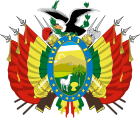
Back صراع الغاز البوليفي Arabic Urolighederne i Bolivia (2003-2006) Danish Gaskrieg in Bolivien German Guerra del Gas (Bolivia) Spanish Guerre du gaz (Bolivie) French ボリビアガス紛争 Japanese Boliviaanse Gasoorlog Dutch Guerra do Gás Portuguese Газовый конфликт в Боливии Russian Bolivianska gaskriget Swedish
 |
|---|
|
|
The Bolivian gas conflict was a social confrontation in Bolivia reaching its peak in 2003, centering on the exploitation of the country's vast natural gas reserves. The expression can be extended to refer to the general conflict in Bolivia over the exploitation of gas resources, thus including the 2005 protests and the election of Evo Morales as president. Before these protests, Bolivia had seen a series of similar earlier protests during the Cochabamba protests of 2000, which were against the privatization of the municipal water supply.
The conflict had its roots in grievances over the government's economic policies concerning natural gas, as well as coca eradication policies, corruption and violent military responses against strikes. On a larger scale, it can be traced to Bolivia's colonization since the 15th century and the subsequent exploitation of its natural resources (e.g., the mines of Potosí).
The "Bolivian gas war" thus came to a head in October 2003, leading to the resignation of President Gonzalo Sánchez de Lozada (aka "Goni"). Strikes and road blocks mounted by indigenous and labour groups (including the COB trade union) brought the country to a standstill. Violent suppression by the Bolivian armed forces left some 60 people dead in October 2003, mostly inhabitants of El Alto, located on the Altiplano above the seat of government La Paz.
The governing coalition disintegrated forcing Goni to resign and leave the country on October 18, 2003. He was succeeded by the vice president, Carlos Mesa, who put the gas issue to a referendum on July 18, 2004. In May 2005, under duress from protesters, the Bolivian congress enacted a new hydrocarbons law, increasing the state's royalties from natural gas exploitation. However, protesters, who included Evo Morales and Felipe Quispe, demanded full nationalization of hydrocarbon resources, and the increased participation of Bolivia's indigenous majority, mainly composed of Aymaras and Quechuas, in the political life of the country. On June 6, 2005, Mesa was forced to resign as tens of thousands of protesters caused daily blockades to La Paz from the rest of the country. Morales' election at the end of 2005 was met with enthusiasm by the social movements, because he was, as the leader of left-wing MAS, one of the staunchest opponents to the exportation of the gas without corresponding industrialization in Bolivia. On May 1, 2006, President Morales signed a decree stating that all gas reserves were to be nationalized: "the state recovers ownership, possession and total and absolute control" of hydrocarbons. The 2006 announcement was met by applause on La Paz's main plaza, where Vice President Alvaro Garcia told the crowd that the government's energy-related revenue would jump US$320 million to US$780 million in 2007,[1] continuing a trend where revenues had expanded nearly sixfold between 2002 and 2006.[2]
- ^ "Nationalization of Gas!". Znet. May 4, 2006. Archived from the original on June 30, 2006. Retrieved 2006-05-24.
- ^ "Bolivia's military takes control of gas fields". Reuters. May 2, 2006. Retrieved October 3, 2010.
© MMXXIII Rich X Search. We shall prevail. All rights reserved. Rich X Search
